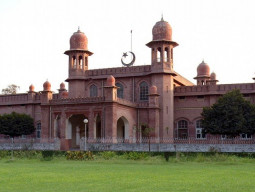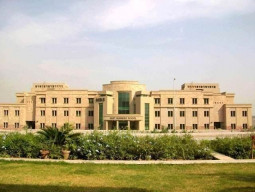
Pakistan among its other south Asian counterparts is lagging behind in the development of quality products and its export to the world due to lack of Research & Development (R&D), which leads towards lack of advancement in science and technology (S&T) and lack of innovative products. In Pakistan out of 195 HEC-recognised public and private universities, 114 are collaborating with 85 public sector organisations. Higher education of a country and S&T are two major fields which have a key role in developing a nation but we are facing budgetary cuts in these fields. Unfortunately, a recent survey shows that Pakistan ranks at 125th among 132 countries in terms of budgetary allocation for higher education.
Our industrial sector badly needs applied research to resolve the real life problems of market. Although, number of dedicated research centers and institutes are established in universities for undertaking the research in health, industrial biotechnology, agriculture, textile and environmental sector along with genetic engineering techniques to address the real time industrial problems and providing practical solutions to those problems but unluckily, despite the fact that these institutes are given high tech expensive equipment; the results are not up to the mark. The reason is lack of a coordinated effort to undertake a unified targeted research which leads towards only piling up a research to produce research papers only and having no practical implication for the industry. The result is that it has no practical presence in the industry but it only exists in the institutes.
There are more than 600 companies operating in pharmaceutical industry out of which 386 are real operating units. Almost 80% of the medicine supply is tackled by national manufacturing units and 20% is exported. Despite the fact that major chunk of pharmaceutical products is locally produced; a meager amount is dedicated for R&D purpose by the local companies, only 30 multinational operating units are giving due weightage to R&D in Pakistan. As far as the educational institutions; awarding relevant degrees are far behind producing R&D drugs. Even if they produce any product there is problem of commercialisation of the product due to lack of linkage with the industry.
A national policy should be formed to address the issue of AI linkage backed by the government for flourishing a culture of S&T and R&D in the country. Policy reforms should be made at the level of universities to empower them to do partnerships with private sector. Since its inception, the HEC was given the role of promoting AI linkage. It can play a vital role in providing funding to marketable research and commercial projects. Budget for higher education should be increased to at least 6% of its GDP, because in Pakistan access to higher education is only 7.8% which ranks it at bottom 6th position with respect to its spending on education.
Development of business incubation centre and technology parks should be encouraged. These centers of excellence should be the key hub for providing solutions to customised industrial problems. Transfer of knowledge and sharing of information are the cornerstones for knowledge-based economies. Such culture can be developed by promoting research activities, conducting seminars, conferences and workshops which in turn lead to opportunities for young scientists to discuss the latest trends in innovation of S&T products. Interaction of industry with the academia will lead to better understanding of research projects in process within universities and possible future collaborations for funding.
Strengthening of universities by the industrial sector is another solution for AI linkage. At first outflow of information from universities to industry and in turn industrial involvement in the form of financial support to universities can play a key role. In this way dependence of universities on government budgets will be reduced. Graduate students of the universities are given access to industry as part of their internship programmes for practical hands on experience; it will build the capacity of students for the knowledge, skills and abilities needed in the market.
Industries should be encouraged to establish R&D units within their premises. Information may be shared by the industry with academicians about the real time industrial problems. Academicians may be hired as consultants to train the people at these R&D centers. Highly skilled young and motivated undergrads may be funded by the industry for their further studies while they work for industry projects.
Published in The Express Tribune, March 12th, 2019.
Like Opinion & Editorial on Facebook, follow @ETOpEd on Twitter to receive all updates on all our daily pieces.






























1714024018-0/ModiLara-(1)1714024018-0-270x192.webp)









COMMENTS
Comments are moderated and generally will be posted if they are on-topic and not abusive.
For more information, please see our Comments FAQ